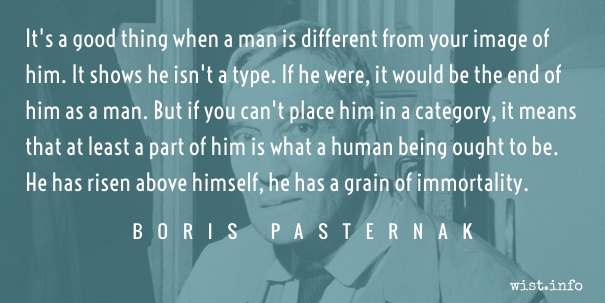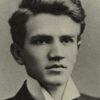It’s a good thing when a man is different from your image of him. It shows he isn’t a type. If he were, it would be the end of him as a man. But if you can’t place him in a category, it means that at least a part of him is what a human being ought to be. He has risen above himself, he has a grain of immortality.
Boris Pasternak (1890-1960) Russian poet, novelist, and literary translator
Doctor Zhivago [До́ктор Жива́го], Part 2, ch. 9 “Varykino,” sec. 4 [Yuri] (1955) [tr. Hayward & Harari (1958), US ed.]
(Source)
Alternate translations:
It’s a good thing when a man is different from your image of him. It shows he isn’t a type. If he were, it would be the end of him as a man. But if you can’t place him in a category, it means that at least a part of him is what a human being ought to be. He has a grain of immortality.
[tr. Hayward & Harari (1958), UK ed.]
It’s good when a man deceives your expectations, when he doesn’t correspond to the preconceived notion of him. To belong to a type is the end of a man, his condemnation. If he doesn’t fall under any category, if he’s not representative, half of what’s demanded of him is there. He’s free of himself, he has achieved a grain of immortality.
[tr. Pevear & Volokhonsky (2010)]
Quotations about:
immortality
Note not all quotations have been tagged, so Search may find additional quotes on this topic.
It seems to be a wise provision of nature that the follies of men should be short-lived; but books interfere and immortalize them. A fool, not content with having bored all those who have lived with him, insists on tormenting generations to come; he would have his folly triumph over oblivion, which should have been as welcome to him as death; he wishes posterity to be informed of his existence, and he would have it remember for ever that he was fool.
[La nature sembloit avoir sagement pourvu à ce que les sottises des hommes fussent passagères, et les livres les immortalisent. Un sot devroit être content d’avoir ennuyé tous ceux qui ont vécu avec lui : il veut encore tourmenter les races futures, il veut que sa sottise triomphe de l’oubli, dont il auroit pu jouir comme du tombeau; il veut que la postérité soit informée qu’il a vécu, et qu’elle sache à jamais qu’il a été un sot.]
Charles-Lewis de Secondat, Baron de Montesquieu (1689-1755) French political philosopher
Persian Letters [Lettres Persanes], Letter 66, Rica to *** (1721) [tr. Davidson (1891)]
(Source)
Commonly paraphrased as "An author is a fool who, not content with having bored those who have lived with him, insists on boring future generations."
(Source (French)). Alternate translations:
Nature seems wisely to have provided that the Follies of Men shou'd pass away, but Books perpetuate them. A Fool ought to be satisfy'd with having teaz'd those who liv'd at the same Time with him: but he is for going further, and is resolved to plague the Generations to come he is resolv'd to make his Impertinence triumph over Oblivion, which he might have enjoy'd as well as his Grave: he will have Posterity know that such a one liv'd, and all future Ages be inform'd that he was a Fool.
[tr. Ozell (1736 ed.), Letter 64]
Nature seems to have provided, that the follies of men should be transient, but they by writing books render them permanent. A fool ought to content himself with having wearied those who lived with him: but he is for tormenting future generations; he is desirous that his folly should triumph over oblivion, which he ought to have enjoyed as well as his grave; he is desirous that posterity should be informed that he lived, and that it should be known for ever that he was a fool.
[tr. Floyd (1762)]
Nature has wisely provided that the follies of men should be ephemeral; but, unhappily, these very follies are immortalised in books. A fool ought to have been satisfied with boring all those who have lived with him; yet he insists on torturing future races; he is determined that his folly shall triumph over the oblivion in which he ought to have been able to find as much enjoyment as he does in his last slumber; he wishes posterity to know that he has lived, and remember forever that he was a fool.
[tr. Betts (1897)]
While nature seems wisely to have provided that the stupidities of men should be transient, books immortalize them. A fool should be content with boring everyone who has lived with him, but he further undertakes to torment future generations. He wants his folly to triumph over the oblivion which he should welcome like the sleep of the tomb; he wants to inform posterity that he has lived, and to have it forever remembered that he was a fool.
[tr. Healy (1964)]
Nature in her wisdom seems to have arranged for man's follies to be short-lived, and books render them immortal. A fool ought to be satisfied with having bored all his own contemporaries, but he also seeks to torment those as yet unborn; he wants his stupidity to triumph over oblivion, which he might, like the tomb, have enjoyed; but no, he wants posterity to be notified that he has lived, and he wants her to know, for all eternity, that he was an idiot.
[tr. Mauldon (2008), Letter 64]
Nature has so arranged things that the absurdities men say are passing things, but books give them immortal life. A fool ought to have been content to have annoyed those who live near him, but instead he wants the chance to torment future generations. He wants his absurdities to triumph over the complete oblivion that he really ought to have welcomed and enjoyed like a tomb. He wants posterity to be informed that he lived, and he wants it known for all time that he was a fool.
[tr. MacKenzie (2014), Letter 64]
One short sleepe past, wee wake eternally,
And death shall be no more; death, thou shalt die.John Donne (1572-1631) English poet
Holy Sonnets, No. 10, “Death Be Not Proud,” ll. 13-14 (1609)
(Source)
Books are embalmed minds; they make the great of other days our present teachers. Through books we look, as through “a glass darkly,” upon those vast multitudes whose bodies have passed to dust, and form the earth we tread upon, and through them we, in our turn, shall be made known to coming time.
Christian Nestell Bovee (1820-1904) American epigrammatist, writer, publisher
Intuitions and Summaries of Thought, Vol. 1, “Books” (1862)
(Source)
If, as certain small-minded philosophers believe, I shall feel nothing at all after death, then at least I don’t have to worry that they will be there to mock me after they die!
[Sin mortuus, ut quidam minuti philosophi censent, nihil sentiam, non vereor ne hunc errorem meum philosophi mortui irrideant.]Marcus Tullius Cicero (106-43 BC) Roman orator, statesman, philosopher
De Senectute [Cato Maior; On Old Age], ch. 23 / sec. 85 (23.85) (44 BC) [tr. Freeman (2016)]
(Source)
Critiquing the Epicurians, who would disagree with his belief in an immortal soul.
(Source (Latin)). Alternate translations:
For if aftir this presente life I be dede as wele in soule as in body as that some yong and smale philosophers of whiche men name Epycures that affermyn, Certayne it is that I shall feele nothyng. And also I am not afferde that suche philosophers so ded mockyn me nor of this myne oppinion. Aftir whiche I verily beleve that the soules be undedly.
[tr. Worcester/Worcester/Scrope (1481)]
And if it were not so, that after death I should feel nothing nor have any sense at all (as certain perrifoggers and bastard philosophers hold opinino) I fear not a whit least these lip-labourers and ideitical philosophers, when they themselves be dead, should scoff and make a mocking-stock at this mine assertion and belief, because they themselves shall also be without sense, and like to brute beasts.
[tr. Newton (1569)]
But if when I am dead (as some small Philosophers say) I shall feel nothing, I fear not least the dead Philosophers should laugh at this my error.
[tr. Austin (1648)]
If those who this Opinion have despis'd,
And their whole life to pleasure sacrific'd;
Should feel their error, they when undeceiv'd,
Too late will wish, that me they had believ'd.
[tr. Denham (1669)]
But if after this Life I shall no longer be sensible, as some little Philosophers imagine, then am I in no Fear that dead Philosophers will laugh at my mistaken Opinion.
[tr. J. D. (1744)]
And if, when dead, I should (as some minute Philosophers imagine) be deprived of all further Sense, I am safe at least in this, that those Blades themselves will have no Opportunity beyond the Grave to laugh at me for my Opinion.
[tr. Logan (1744)]
I have the satisfaction in the meantime to be assured that if death should utterly extinguish my existence, as some minute philosophers assert, the groundless hope I entertained of an after-life in some better state cannot expose me to the derision of these wonderful sages, when they and I shall be no more.
[tr. Melmoth (1773)]
But if (as certain super-subtle philosophers conclude) I shall feel nothing, I am not afraid lest these philosophers, when dead, should ridicule this error of mine.
[Cornish Bros. ed. (1847)]
But if I, when dead, shall have no consciousness, as some narrow-minded philosophers imagine, I do not fear lest dead philosophers should ridicule this my delusion.
[tr. Edmonds (1874)]
While if in death, as some paltry philosophers think, I shall have no consciousness, the dead philosophers cannot ridicule this delusion of mine.
[tr. Peabody (1884)]
But if when dead, as some insignificant philosophers think, I am to be without sensation, I am not afraid of dead philosophers deriding my errors.
[tr. Shuckburgh (1895)]
But if when dead;
As some philosophers of little note
Believe, I feel no more, there is no fear
These dead philosophers should mock me there.
[tr. Allison (1916)]
But if when dead I am going to be without sensation (as some petty philosophers think), then I have no fear that these seers, when they are dead, will have the laugh on me!
[tr. Falconer (1923)]
True, certain insignificant philosophers hold that I shall feel nothing after death. If so, then at least I need not fear that after their own deaths they will be able to mock my conviction!
[tr. Grant (1960, 1971 ed.)]
If on the other hand, as certain petty philosophers have held, I shall have no sensation when I am dead, then I need have no fear that deceased philosophers will make fun of this delusion of mine.
[tr. Copley (1967)]
Some second-rate philosophers suggest that when I am dead I will be conscious of nothing. But all that means is that, if I’m wrong, they won't be able to make fun of me after their death.
[tr. Cobbold (2012)]
But anyway, if when I die my spirit also dies, I certainly won't give a flip about the opinions of dead philosophers.
[tr. Gerberding (2014)]
If when I am dead I’ll have no sensation,
As some small philosophers think, I won’t fear
Accents of derision from their graves to hear.
[tr. Bozzi (2015)]
But if I err in this Opinion, that the Soul of Man is immortal, sure it is a pleasing Error, so pleasing that I can never shake it off while I live.
[Quod si in hoc erro, qui animos hominum immortalis esse credam, libenter erro nec mihi hunc errorem, quo delector, dum vivo, extorqueri volo.]
Marcus Tullius Cicero (106-43 BC) Roman orator, statesman, philosopher
De Senectute [Cato Maior; On Old Age], ch. 23 / sec. 85 (23.85) (44 BC) [tr. J. D. (1744)]
(Source)
(Source (Latin)). Alternate translations:
But if it be in erroure and oute of trouthe aftir the doctryne and scole of Epycures by cause that I beleve that the soules be undedly and Immortelle perdurable and evirlastyng I answere you that this errour pleasith me and I consente me in it right gladly and as long tyme as I lyve I wille not that any philosopher nor any othir of what condicyon that evir he be take awey fro me this erroure wherin I delyte me.
[tr. Worcester/Worcester/Scrope (1481)]
And if I do err because I think that the souls of men be immortal, verily I am well contented in the same error still to continue, and as long as I live I will never renounce nor recant the same, wherein I take such singular pleasure and comfort.
[tr. Newton (1569)]
But if I do erre that the soules of men bee immortall, I do err willingly, neither will I while I live be wrested from mine opinion wherein I am delighted.
[tr. Austin (1648), ch. 24]
My hope's, if this assurance hath deceiv'd,
(That I Man's Soul Immortal have believ'd)
And if I erre, no Pow'r shall dispossess
My thoughts of that expected happiness.
[tr. Denham (1669), Part 4]
But if I should be mistaken in this Belief, that our Souls are immortal, I am however pleased and happy in my Mistake; nor while I live, shall it ever be in the Power of Man, to beat me out of an Opinion, that yields me so solid a Comfort, and so durable a Satisfaction.
[tr. Logan (1744)]
And after all should this my firm persuasion of the soul's immortality prove to be a mere delusion, it is at least a pleasing delusion, and I will cherish it to my latest breath.
[tr. Melmoth (1773)]
But if I err in this, that I believe the soules of men to be immortal, I err willingly, nor do I wish this error to be wrested from me while I live.
[Cornish Bros. ed. (1847)]
And if I am wrong in this, that I believe the souls of men to be immortal, I willingly delude myself : nor do I desire that this mistake, in which I take pleasure, should be wrested from me as long as I live.
[tr. Edmonds (1874)]
But if I err in believing that the souls of men are immortal, I am glad thus to err, nor am I willing that this error in which I delight shall be wrested from me so long as I live.
[tr. Peabody (1884)]
But if I am wrong in thinking the human soul immortal, I am glad to be wrong; nor will I allow the mistake which gives me so much pleasure to be wrested from me as long as I live.
[tr. Shuckburgh (1895)]
But if in thinking souls immortal thus,
I am in error, I confess to you,
It is an error that I glory in,
And being so pleasant, I would not desire
To lose it while I live.
[tr. Allison (1916)]
And if I err in my belief that the souls of men are immortal, I gladly err, nor do I wish this error which gives me pleasure to be wrested from me while I live.
[tr. Falconer (1923)]
Even if I am mistaken in my belief that the soul is immortal, I make the mistake gladly, for the belief makes me happy, and is one which as long as I live I want to retain.
[tr. Grant (1960, 1971 ed.)]
And if I am deluded in believing that the soul of man is immortal, then I am glad to be deluded, and I hope no one, as long as I live, will ever wrench this delusion from me.
[tr. Copley (1967)]
But if I am mistaken in this belief of mine that the souls of men are immortal, then I am happy to be mistaken; but as long as I am still alive, I have no wish to be disabused of my mistake.
[tr. Cobbold (2012)]
I may be wrong in my belief in the immorality of the spirit: there are philosophers who think I am. I like my faith and I don't want to lose it.
[tr. Gerberding (2014)]
And if it is an error of mine to imply
That man is endowed with immortal soul,
I err with pleasure and promptly console
Myself as long as I am alive and spry.
[tr. Bozzi (2015)]
And if I’m wrong in my belief that souls are immortal, then gladly do I err, for this belief, which I hope to maintain as long as I live, makes me happy.
[tr. Freeman (2016)]
For of old
Rome said to me — “Your readers are your gold.
By them the stream of Lethe you’ll survive,
By them the better part of you will live.”
The wild fig splits Messalla’s marbles through,
And Crispus’ steeds are shattered quite in two :
But books are helped by time nor hurt by thieves,
Memorials that death uninjured leaves.[Quem cum mihi Roma dedisset.
“Nil tibi quod demus maius habemus” ait.
“Pigra per hunc fugies ingratae flumina Lethes
Et meliore tui parte superstes eris.
Marmora Messallae findit caprificus, et audax
Dimidios Crispi mulio ridet equos:
At chartis nec furta nocent et saecula prosunt,
Solaque non norunt haec monumenta mori.”]Martial (AD c.39-c.103) Spanish Roman poet, satirist, epigrammatist [Marcus Valerius Martialis]
Epigrams [Epigrammata], Book 10, epigram 2 (10.2) (AD 95, 98 ed.)[tr. Pott & Wright (1921)]
(Source)
(Source (Latin)). Alternate translations:
Reader, my wealth; whom when to me Rome gave,
Nought greater to bestow (quoth she) I have.
By him ingratefull Lethe thou shalt flye,
And in thy better part shalt never dye.
Wilde Fig-trees rend Messalla's Marbles off;
Crispus halfe-horses the bold Carters scoffe.
Writings no age can wrong, no thieving hand.
Deathlesse alone those Monuments will stand.
[tr. May (1629)]
When Fate to me a constant reader gave;
Receive, she said, the greatest boon I have.
By this beyond oblivion's stream arrive;
And in your better party by this survive.
Statues may moulder; and the clown unbred
Scoff at young Ammon's horse without his head.
But finish'd writings theft and time defy;
The only monument, which cannot die.
[tr. Hay (1755)]
Reader, our riches! Well, said, Rome, I know,
A blester boon I have not to bestow.
By this though thro' Lethean streams shalt strive,
And in thy better part shalt still survive.
The wilding may Messala's marble cleave,
The speaker silence, and the sculptor reave.
The mule's pert driver may reproachless laugh,
At Crispus' coursers dwindled down to half.
Wit's labors onely rape or age defy:
His monuments alone can never die.
[tr. Elphinston (1782)]
When Rome gave you [readers] to me, she said, "I have nothing greater to give you. By his means you will escape the sluggish waves of ungrateful Lethe, and will survive in the better part of yourself. The marble tomb of Messale is split by the wild fig, and the audacious muleteer laughs at the mutilated horses of the statue of Crispus.1 But as for writings, they are indestructible either by thieves or the ravages of time; such monuments alone are proof against death."
[tr. Bohn's Classical (1859)]
For when Rome had given you to me, she said: We have nothing greater to give you. By him will you escape unthankful Lethe's sluggish stream, and will in your better part survive. Messalla's marble the wild-fig sunders, and boldly the mule-driver laughs at Crispus' steeds broken in two. But writings thefts do not injure, and time befriends them, and alone these monuments know not death."
[tr. Ker (1919)]
Rome can tell how dear,
Who gave thee, saying, "Take my best; 'tis here;
By him ungrateful Lethe thou shallt flee
And thy best parts have immortality."
The fig-tree splits Messala's marble blocks,
And the rough drover draggled Crispus mocks.
Verses grow great with Time and Fate defy;
Such monuments alone can never die.
[tr. Francis & Tatum (1924), ep. 508]
When Rome gave you to me, she said: "I have nothing greater to give you. through him you will escape ungrateful Lethe's idle waters and survive in the better part of yourself. The fig tree splits Messalla's marble, the bold muleteer laughs at Crispus' halved horses. But thefts do not harm paper and the centuries do it good. These are the only memorials that cannot die."
[tr. Shackleton Bailey (1993)]
Reader, Patron, willed to me by Rome
saying: "No greater gift! Through him
You'll flee neglectful Lethe's stagnant flood --
the better part of you survive.
Wild-fig rives the marble, heedless muleteers
deride the busted steeds of bronze.
But verse no decrease knows, time adds to verse,
deathless alone of monuments."
[tr. Whigham (1985), "Rome's Gift"]
The aim of every artist is to arrest motion, which is life, by artificial means and hold it fixed so that a hundred years later, when a stranger looks at it, it moves again since it is life. Since man is mortal, the only immortality possible for him is to leave something behind him that is immortal since it will always move. This is the artist’s way of scribbling “Kilroy was here” on the wall of the final and irrevocable oblivion through which he must someday pass.
William Faulkner (1897-1962) American novelist
“The Art of Fiction,” Interview by Jean Stein, Paris Review #12 (Spring 1956)
(Source)
To me the honour is sufficient of belonging to the universe — such a great universe, and so grand a scheme of things. Not even Death can rob me of that honour. For nothing can alter the fact that I have lived; I have been I, if for ever so short a time. And when I am dead, the matter which composes my body is indestructible — and eternal, so that come what may to my “Soul,” my dust will always be going on, each separate atom of me playing its separate part — I shall still have some sort of a finger in the pie. When I am dead, you can boil me, burn me, drown me, scatter me — but you cannot destroy me: my little atoms would merely deride such heavy vengeance. Death can do no more than kill you.
W. N. P. Barbellion (1889-1919) English diarist [William Nero Pilate Barbellion, pen name of Bruce Frederick Cummings]
The Journal of a Disappointed Man, 1912-12-22 (1919)
(Source)
Ah my friend, if you and I could escape this fray
and live forever, never a trace of age, immortal,
I would never fight on the front lines again
or command you to the field where men win fame.
But now, as it is, the fates of death await us,
thousands poised to strike, and not a man alive
can flee them or escape — so in we go for attack!
Give our enemy glory or win it for ourselves![Ὦ πέπον εἰ μὲν γὰρ πόλεμον περὶ τόνδε φυγόντε
αἰεὶ δὴ μέλλοιμεν ἀγήρω τ’ ἀθανάτω τε
ἔσσεσθ’, οὔτέ κεν αὐτὸς ἐνὶ πρώτοισι μαχοίμην
οὔτέ κε σὲ στέλλοιμι μάχην ἐς κυδιάνειραν·
νῦν δ’ ἔμπης γὰρ κῆρες ἐφεστᾶσιν θανάτοιο
μυρίαι, ἃς οὐκ ἔστι φυγεῖν βροτὸν οὐδ’ ὑπαλύξαι,
ἴομεν ἠέ τῳ εὖχος ὀρέξομεν ἠέ τις ἡμῖν.]Homer (fl. 7th-8th C. BC) Greek author
The Iliad [Ἰλιάς], Book 12, l. 322ff (12.322-328) [Sarpedon to Glaukos] (c. 750 BC) [tr. Fagles (1990), ll. 374-81]
Original Greek. Alt. trans.:
O friend, if keeping back
Would keep back age from us, and death, and that we might not wrack
In this life’s human sea at all, but that deferring now
We shunn’d death ever, nor would I half this vain valour show,
Nor glorify a folly so, to wish thee to advance;
But since we must go, though not here, and that, besides the chance
Propos’d now, there are infinite fates of other sort in death,
Which, neither to be fled nor ’scap’d, a man must sink beneath,
Come, try we, if this sort be ours, and either render thus
Glory to others, or make them resign the like to us.
[tr. Chapman (1611), ll. 323-33]
Could all our care elude the gloomy grave,
Which claims no less the fearful than the brave,
For lust of fame I should not vainly dare
In fighting fields, nor urge thy soul to war;
But since, alas! ignoble age must come,
Disease, and death's inexorable doom;
The life which others pay, let us bestow,
And give to fame what we to nature owe;
Brave though we fall, and honoured if we live,
Or let us glory gain, or glory give!
[tr. Pope (1715-20)]
Oh Glaucus, if escaping safe the death
That threats us here, we also could escape
Old age, and to ourselves secure a life
Immortal, I would neither in the van
Myself expose, nor would encourage thee
To tempt the perils of the glorious field.
But since a thousand messengers of fate
Pursue us close, and man is born to die --
E’en let us on; the prize of glory yield,
If yield we must, or wrest it from the foe.
[tr. Cowper (1791), ll. 389-98]
O dear friend, if indeed, by escaping from this war, we were destined to be ever free from old age, and immortal, neither would I combat myself in the van, nor send thee into the glorious battle. But now -- for of a truth ten thousand Fates of death press upon us, which it is not possible for a mortal to escape or avoid -- let us on: either we shall give glory to some one, or some one to us.
[tr. Buckley (1860)]
O friend! if we, survivors of this war,
Could live, from age and death for ever free,
Thou shouldst not see me foremost in the fight,
Nor would I urge thee to the glorious field:
But since on man ten thousand forms of death
Attend, which none may ’scape, then on, that we
May glory on others gain, or they on us!
[tr. Derby (1864)]
Ah, friend, if once escaped from this battle we were for ever to be ageless and immortal, neither would I fight myself in the foremost ranks, nor would I send thee into the war that giveth men renown, but now -- for assuredly ten thousand fates of death do every way beset us, and these no mortal may escape nor avoid -- now let us go forward, whether we shall give glory to other men, or others to us.
[tr. Leaf/Lang/Myers (1891)]
My good friend, if, when we were once out of this fight, we could escape old age and death thenceforward and for ever, I should neither press forward myself nor bid you do so, but death in ten thousand shapes hangs ever over our heads, and no man can elude him; therefore let us go forward and either win glory for ourselves, or yield it to another.
[tr. Butler (1898)]
Ah friend, if once escaped from this battle we were for ever to be ageless and immortal, neither should I fight myself amid the foremost, nor should I send thee into battle where men win glory; but now -- for in any case fates of death beset us, fates past counting, which no mortal may escape or avoid -- now let us go forward, whether we shall give glory to another, or another to us.
[tr. Murray (1924)]
Man, supposing you and I, escaping this battle,
would be able to live on forever, ageless, immortal,
so neither would I myself go on fighting in the foremost,
nor would I urge you into the fighting where men win glory.
But now, seeing that the spirits of death stand close about us
in their thousands, no man can turn aside or escape them,
let us go on and win glory for ourselves, or yield it to others.
[tr. Lattimore (1951)]
But now a thousand shapes of death surround us,
and no man can escape the, or be safe. Let us attack --
whether to give some fellow glory or to win it from him.
[tr. Fitzgerald (1974)]
After all, to the well-organized mind, death is but the next great adventure. You know, the Stone was really not such a wonderful thing. As much money and life as you could want! The two things most human beings would choose above all — the trouble is, humans do have a knack for choosing precisely those things that are worst for them.
Man is so built that he cannot imagine his own death. This leads to endless invention of religions. While this conviction by no means proves immortality to be a fact, questions generated by it are overwhelmingly important. The nature of life, how ego hooks into the body, the problem of ego itself and why each ego seems to be the center of the universe, the purpose of life, the purpose of the universe — these are paramount questions, Ben; they can never be trivial. Science hasn’t solved them — and who am I to sneer at religions for trying, no matter how unconvincingly to me? Old Mumbo Jumbo may eat me yet; I can’t rule him out because he owns no fancy cathedrals. Nor can I rule out one godstruck boy leading a sex cult in an upholstered attic; he might be the Messiah. The only religious opinion I feel sure of is this: self-awareness is not just a bunch of amino acids bumping together!
Robert A. Heinlein (1907-1988) American writer
Stranger in a Strange Land, Part 4, ch. 33 [Jubal] (1961)
(Source)
In the "uncut" original version (1960): "Self-aware man is so built that he cannot believe in his own extinction ... and this automatically leads to endless invention of religions. While this involuntary conviction of immortality by no means proves immortality to be a fact, the questions generated by this conviction are overwhelmingly important ... whether we can answer them or not, or prove what answers we suspect. The nature of life, how the ego hooks into the physical body, the problem of the ego itself and why each ego seems to be the center of the universe, the purpose of life, the purpose of the universe -- these are paramount questions Ben; they can never be trivial. Science can't, or hasn't, coped with any of them -- and who am I to sneer at religions for trying to answer them, no matter how unconvincingly to me? Old Mumbo Jumbo may eat me yet; I can't rule Him out because He owns no fancy cathedrals. Nor can I rule out one godstruck boy leading a sex cult in an upholstered attic; he might be the Messiah. The only religious opinion that I feel sure of is this: self-awareness is not just a bunch of amino acids bumping together!"
Consider and act with reference to the true ends of existence. This world is but the vestibule of an immortal life. Every action of our lives touches on some chord that will vibrate in eternity.
Edwin Hubbell Chapin (1814-1880) American clergyman
(Attributed)
(Source)
Quoted in Charles Northend, Memory Gems (1890).
Variant: "Every action of your life touches on some chord that will vibrate in eternity." ["Advice to the Young," quoted in Charles W. Sanders, Sanders' Union Fourth Reader (1873)]
A thing of beauty is a joy for ever:
Its loveliness increases; it will never
Pass into nothingness.
JOYCE: An artist is the magician put among men to gratify — capriciously — their urge for immortality. The temples are built and brought down around him, continuously and contiguously, from Troy to the fields of Flanders. If there is any meaning in any of it, it is in what survives as art, yes even in the celebration of tyrants, yes even in the celebration of nonentities. What now of the Trojan War if it had been passed over by the artist’s touch? Dust. A forgotten expedition prompted by Greek merchants looking for new markets. A minor redistribution of broken pots. But it is we who stand enriched, by a tale of heroes, of a golden apple, a wooden horse, a face that launched a thousand ships —– and above all, of Ulysses, the wanderer, the most human, the most complete of all heroes — husband, father, son, lover, farmer, soldier, pacifist, politician, inventor and adventurer.
Here is my Creed: I believe in one God, Creator of the Universe. That He governs it by his Providence. That he ought to be worshipped. That the most acceptable Service we can render to him, is doing Good to his other Children. That the Soul of Man is immortal, and will be treated with Justice in another Life respecting its Conduct in this. These I take to be the fundamental Principles of all sound Religion, and I regard them as you do, in whatever Sect I meet with them.
Benjamin Franklin (1706-1790) American statesman, scientist, philosopher, aphorist
Letter to Ezra Stiles (9 Mar 1790)
(Source)
And is he dead whose glorious mind
Lifts thine on high?
To live in the hearts we leave
Is not to die!
CATO: The soul, secur’d in her existence, smiles
At the drawn dagger, and defies its point.Joseph Addison (1672-1719) English essayist, poet, statesman
Cato, Act 5, sc. 1, l. 124ff (1713)
(Source)
I cannot imagine a God who rewards and punishes the objects of his creation, whose purposes are modeled after our own — a God, in short, who is but a reflection of human frailty. Neither can I believe that the individual survives the death of his body, although feeble souls harbor such thoughts through fear or ridiculous egotism. It is enough for me to contemplate the mystery of conscious life perpetuating itself through all eternity, to reflect upon the marvelous structure of the universe which we can dimly perceive, and to try humbly to comprehend even an infinitesimal part of the intelligence manifested in nature.
Albert Einstein (1879-1955) German-American physicist
“What I Believe,” Forum and Century (Oct 1930)
(Source)
Einstein crafted and recrafted his credo multiple times in this period, and specifics are often muddled by differing translations and by his reuse of certain phrases in later writing. The Forum and Century entry appears to be the earliest. Some important variants:
I cannot conceive of a God who rewards and punishes his creatures, or has a will of the kind that we experience in ourselves. Neither ca I nor would I want to conceive of an individual that survives his physical death; let feeble souls, from fear or absurd egoism, cherish such thoughts. I am satisfied with they mystery of the eternity of life and with the awareness and a glimpse of the marvelous structure of the existing world, together with the devoted striving to comprehend a portion, be it ever so tiny, of the reason that manifests itself in nature.
— "The World As I See It [Mein Weltbild] [tr. Bargmann (1954)]
I cannot conceive of a God who rewards and punishes his creatures, or has a will of the type of which we are conscious in ourselves. An individual who should survive his physical death is also beyond my comprehension, nor do I wish it otherwise; such notions are for the fears or absurd egoism of feeble souls. Enough for me the mystery of the eternity of life, and the inkling of the marvellous structure of reality, together with the single-hearted endeavor to comprehend a portion, be it never so tiny, of the reason that manifests itself in nature.
— "The World As I See It [Mein Weltbild] [tr. Harris (1934)]
To me it suffices to wonder at these secrets and to attempt humbly to grasp with my mind a mere image of the lofty structure of all there is.
[Es ist mir genug, diese Geheimnisse staunend zu ahnen und zu versuchen, von der erhabenen Struktur des Seienden in Demut ein mattes Abbild geistig zu erfassen.]
— Reduced variant in "My Credo Mein Glaubensbekenntnis]" (Aug 1932)
I had rather live and love where death is king, than have eternal life where love is not.
Robert Green Ingersoll (1833-1899) American lawyer, agnostic, orator
“At a Child’s Grave” (8 Jan 1882)
(Source)
So, whatsoever that be within us which feels, thinks, desires, and animates us, it is something celestial, divine, and, consequently, imperishable.
Aristotle (384-322 BC) Greek philosopher
(Attributed)
(Source)
The earliest reference to this text that I can find is in Louis Alphonse Cahagnet, Magnétisme: The Celestial Telegraph (1850), who attributes it to Cicero's "Explanation of the Doctrines of Aristotle." It is unclear which of Cicero's actual works this refers to, and it doesn't come across as Aristotelian (or even Ciceronian), and, given the source, may be distorted, poorly translated, or bogus.



























